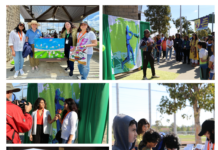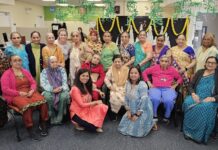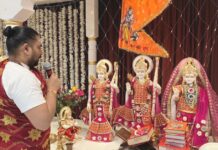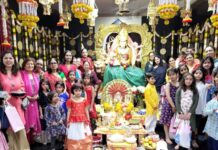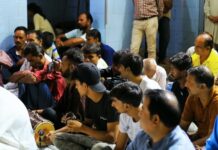
Mayor Rham Emanuel. Looking on is Father Costello
CHICAGO: The celebration of Gandhi Legacy, a program jointly organized by the Delhi Committee of Chicago Sister Cities International, in conjunction with Loyola University Chicago last week at Loyola University Chicago-Corboy Law Center in Downtown Chicago was a huge success, judging by the impact it created on the morale of the community thru reiterating the values for which Gandhiji lived and died.
Though not in the foreground, the genius and touch of community stalwart and activist Niranjan Shah was in evidence. Shah was unanimously elected as Trustee last summer by the University Trustee Board.
The near two hours program, as succinctly put by Smita Shah, chair of the Delhi Committee of the Sister Cities International, was to promote an exchange of ideas as exemplified by Gandhiji’s work that was influenced greatly by Henry David Thoreau (especially his essay on civil disobedience) and which in its turn influenced, yet another American Hero Martin Luther King, in his crusade for social quality and justice.
The program sought one more time to underline the relevance and importance of Gandhian philosophy of Ahimsa (non violence) and Satyagraha (insistence for Truth) in solving major problems facing the violence plagued world today. Its importance got further highlighted with the presence of Chicago Mayor Rham Emanuel and a cross section of Indian American community leaders and Chicago elites.
The culmination of the event could not have been better tuned than with the presentation of a Mahatma Gandhi photograph (a morning walk with Ashramites) by Niranjan Shah to Mayor Rham Emanuel after a few select clips from Gandhi movie that overwhelmed everybody present with emotions.
The background music – a soft low key playing of popular Gandhi bhajan Raghupati Raghav – added a special touch and flavor that made many feel the invisible presence of this great world leader whom Albert Einstein said it was difficult to believe “a man as this one in flesh and blood ever walked on this world.”
The Mayor too with his emotions flowing decided to carry the picture himself rather than by aides. The picture, incidentally was developed from the original negative done by Mary Burke, a famous photographer who interviewed Gandhi, many times.
Smita Shah, the chair of the Delhi Chicago Sister Citiy Program, said that it has always been an effort to promote social, cultural and economic exchange.
The value of the exchange of ideas is exemplified by Gandhiji’s work, which was greatly influenced by Henry David Thoreau, particularly his essay on civil disobedience. Gandhiji in turn inspired Martin Luther King, champion of civil liberty in his country.
“Some people do not realize that Martin Luther King went to India, and his feeling for Mahatma Gandhi was so great, that he says, “To other countries, I go as a tourist, but to India, I come as a pilgrim”.
Echoing the same sentiment, Mayor Rham Emmanuel said “I too went to India with a special feelings of a pilgrim. Smita Shah, who welcomed and introduced the Mayor, said that the Mayor recognizes that the values of safety, economic equality, and education are important to the Indian community, but are universal to all communities.
Gandhiji knew that education was required to free his people. The Mayor has echoed that through his commitment to education, by striving to make sure each and every child of Chicago receives an education. By strengthening the communities and neighborhoods, the city of Chicago has become a strong global city, she observed
Responding Mayor Rham in his brief remark said that “I recognize Martin Luther King’s sentiment that you go to other places as a tourist, but to India as a pilgrim. I went there with my family in a private trip, and the experience was amazing for me, my wife, and my children.”
He also chose to observe that “Devon Avenue is my favorite place in the city, because it is the only place that starts with Mahatma Gandhi on one end, and ends with Golda Meir in the other. It is the heart of this city.” Incidentally, a stretch of Devon Avenue houses over 250 small and big commercial establishments owned by Desis and is often described as mini India Town.
The Mayor also lauded the Indian American community as well as Loyola University for its huge emphasis on quality education. He said “”Loyola University has an IB teaching program, and that is critical to creating teachers that strengthen our schools. Programs like these create opportunities for the children of our city.”
Smita Shah also introduced Indian Consul General Dr Ausuf Sayeed and lauded his efforts in projecting India in its true colors. The Indian CG congratulated Smita Shah and the Delhi Committee Sister City Program “for doing creditable work as an independent and non-profit body by bringing the two cities, closer economically, culturally and socially.”
Talking about Bapu (the way Indians called and recognized Mahatma) and his philosophy, Dr Ausuf was very effervescent quipping “What is Gandhism? ,” and then chose to explain in his own words “Gandhism as far as I believe, is to fight against the negative forces with a blunt weapon of peace, perseverance and non-violence. Years may have passed since the Mahatma walked the face of the earth, but his treasured ideals and principles still hold forth. ”
“Mahatma bequeathed to us three guiding principles: Ahimsa (or non- violence), Satyagraha (or the force born of truth and non-violence) and Sarvodaya (or upliftment of all). It is the values of these principles that we have to rediscover if we want to deal effectively with today’s challenges. I am glad to say that an increasing number of young people in India and elsewhere are today turning to him (Mahatma Gandhi) to seek solutions to contemporary concerns through individual and collective action.”
Concluding he said the collaboration between the Sister Cities Program and World Business Chicago is only going to further boost economic development, art, culture, sports between US and Indian communities.
Father John F Costello, Vice President and Special Assistant to the President, Loyola University Chicago, in his brief address said that Bapu Gandhi had given an awesome gift to the world in the form of new light illuminating the spirit of hope and freedom. The festival Indian season (Diwali) follows the birth anniversary of Bapu (October 2) whose radiant love mirrored that of our Creator. He ended his address with beautiful remarks “Thank you Bapu and India for your incredible gift and the fragrances of freedom within which its powerful allure sweetens all of us,”
Among the dignitaries present were Will Burn, Member of City Council, Kim Fox, Deputy States Attorney, Paula Allen Mears, Chancellor UIC, Brian McPartlin, former Director of Advance for President Clinton, Matt Crawl, Partner in Law firm, several senior officers from BNY Mellon, Morgan Stanley, Denise Jorgan Program from University of Chicago.
The consensus at the meet was that the work done by Mahatma Gandhi is universally known but by talking about Gandhiji, the impact that is made leads to raising of our profile and that of India here and everywhere.
Ramesh Soparawala
India Post News Service


